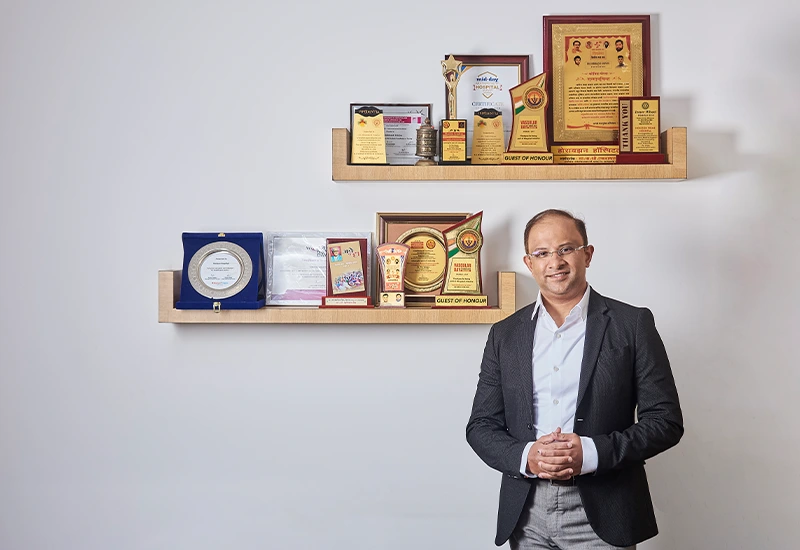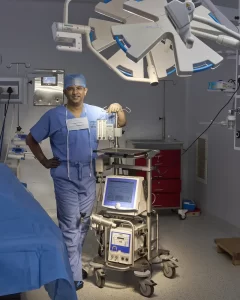Chronic Obstructive Pulmonary disease ( COPD )
COPD Treatment in Thane: Expert Care with Dr. Hrushikesh Vaidya
Chronic Obstructive Pulmonary Disease (COPD) is a progressive lung disease that significantly impacts breathing and overall quality of life. As one of the leading causes of respiratory illness globally, COPD requires timely and expert intervention. Specialized care is essential for managing symptoms, slowing disease progression, and enhancing the patient’s well-being.
Dr. Hrushikesh Vaidya stands out as a distinguished specialist in COPD treatment in Thane and Mumbai. With years of experience in pulmonology, Dr. Vaidya offers advanced care tailored to the unique needs of each patient.

What is COPD? Understanding the Disease
Definition of COPD
Chronic Obstructive Pulmonary Disease (COPD) is a group of lung conditions, primarily including emphysema and chronic bronchitis, that obstruct airflow and make breathing difficult.
Causes and Risk Factors
Smoking
The primary cause of COPD, affecting both active and passive smokers.
Environmental Factors
Prolonged exposure to air pollutants, dust, and chemicals can damage lung tissue.
Genetics
A hereditary deficiency in alpha-1 antitrypsin protein increases susceptibility.
Common Symptoms
- Persistent coughing, often with mucus
- Shortness of breath, especially during physical activity
- Frequent respiratory infections
- Wheezing and chest tightness
What are the 4 stages of COPD?
Stage 1: Mild COPD
Symptoms
- Mild cough
- Slight shortness of breath
- Occasional wheezing
- Mild mucus production
Stage 2: Moderate COPD
Symptoms
- Increased shortness of breath
- Chronic cough
- Increased sputum production (mucus)
Stage 3: Severe COPD
Symptoms
- Persistent breathlessness
- Frequent flare-ups
- Recurrent infections
- Reduced tolerance
Stage 4: Very Severe COPD
Symptoms
- Severe breathlessness
- Constant symptoms
- Respiratory failure
- Heart complications
Stage 1: Mild COPD
Lung Function
- Normal lung function
- FEV1 ≥ 80%
- Mild airflow limitation
- No significant obstruction
Stage 2: Moderate COPD
Lung Function
- Moderate airflow limitation
- FEV1 between 50%–79%
- Reduced lung function
- Possible symptoms on exertion
Stage 3: Severe COPD
Lung Function
- Severe airflow limitation
- FEV1 between 30%–49%
- Significant lung impairment
- Marked symptoms at rest
Stage 4: Very Severe COPD
Lung Function
- Very severe airflow limitation
- FEV1 < 30%
- Respiratory failure risk
- Severe functional impairment
Stage 1: Mild COPD
Treatment
- Quit smoking
- Use inhalers
- Healthy lifestyle
- Manage symptoms
Stage 2: Moderate COPD
Treatment
- Inhalers & bronchodilators
- Corticosteroids
- Pulmonary rehab
- Symptom control
Stage 3: Severe COPD
Treatment
- Stronger medications
- Oxygen therapy
- Pulmonary rehabilitation
- Reduce flare-ups
Stage 4: Very Severe COPD
Treatment
- Long-term oxygen therapy
- Lung volume reduction
- Lung transplant
- Surgical options

Why Choose Dr. Hrushikesh Vaidya for COPD Care?
- Qualifications and Expertise : Dr. Hrushikesh Vaidya is a highly trained pulmonologist with extensive experience in diagnosing and treating COPD across all stages.
- Patient Success Stories: Patients under Dr. Hrushikesh Vaidya’s care often praise his empathetic approach and the remarkable improvement in their quality of life.
- Commitment to Advanced Care: Dr. Hrushikesh Vaidya stays abreast of global advancements in pulmonology, ensuring patients receive cutting-edge treatments.
- Collaboration with Leading Hospitals: Dr. Hrushikesh Vaidya works with renowned healthcare institutions in Mumbai, providing access to state-of-the-art facilities and multidisciplinary care.
FAQs
The best inhalers depend on the severity of COPD. Common options include bronchodilators, corticosteroids, and combination therapies. Dr. Vaidya can recommend the most effective inhaler for your condition.
Yes, with early diagnosis, medication, pulmonary rehabilitation, and lifestyle changes, many COPD cases can be managed on an outpatient basis.
Early stages focus on smoking cessation and mild bronchodilators, while advanced stages may require oxygen therapy, intensive medication, or even surgical interventions.